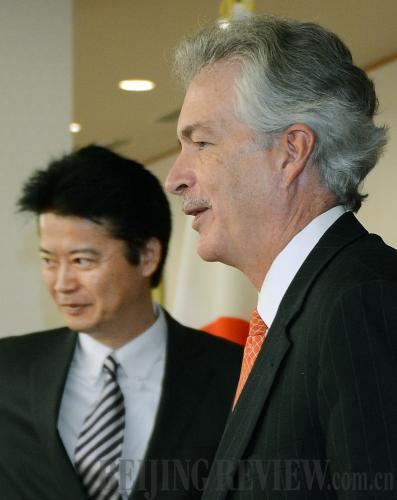|
 |
|
SEEKING INFLUENCE: U.S. Deputy Secretary of State William Burns (right) meets Japanese Foreign Minister Koichiro Gemba in Tokyo on October 15 during his Asia-Pacific trip (XINHUA/AFP) |
Shortly after talking with U.S. Deputy Secretary of State William Burns, Japanese Foreign Minister Koichiro Gemba embarked on a trip to Britain, France and Germany on October 16, intending to lobby the three Western nations for support.
Chinese observers say Gemba's efforts were futile because there is no reliable evidence backing Japan's claims over the Diaoyu Islands. Moreover, Japan's attempts to bolster its claims internationally are of little help for the settlement of the dispute. While calling on Tokyo to return to the negotiating table, analysts urged the Japanese authorities to halt diplomatic and military actions concerning the islands.
"Gemba's trip might add fuel to the fire over the dispute, but it is highly unlikely that the three European nations would declare support for Japan's stance," said Zhou Yongsheng, a professor of Japanese studies with China Foreign Affairs University.
Liu Jiangyong, a professor at the Institute of International Studies of Tsinghua University, echoed Zhou in saying that even the United States doesn't take sides publicly over the issue, let alone European countries.
Toothless lobby
"As more and more countries around the world learn of the context surrounding the Diaoyu Islands dispute, Japan feels its position is weakening in world opinion. Gemba's European trip was a diplomatic gesture aimed at recovering some ground, but it would not work," Zhou said in an interview with Beijing Review at the beginning of Gemba's trip.
"The three nations in Europe certainly will receive Gemba out of diplomatic courtesy. But not a single mature statesman will stand behind Japan on the islands dispute," Zhou said.
Liu said that in response to pressure from domestic public opinion over the dispute, the Japanese Government began to adjust its tactics and seek support from the international community. However, without concrete evidence, Japan's stance can hardly be accepted by the outside world.
Evidence from China has shown clearly that the Diaoyu Islands have been Chinese territory since the Ming Dynasty (1368-1644). The Diaoyu Islands were first discovered, named and exploited by the Chinese. Since the 14th and 15th centuries, the islands have been included in Chinese maps. Foreign maps also show that the Diaoyu Islands belong to China. The islands were occupied by Japan after China lost the Sino-Japanese War of 1894-95.
Meanwhile, Japan's "evidence" amounted to nothing more than broken pieces of unconfirmed documents and confusion between "control" and "sovereignty," observers said. International documents also show Japan's claims over the Diaoyu Islands are groundless.
The Cairo Declaration, issued in December 1943 during World War II, stated that "all the territories Japan has stolen from the Chinese" shall be restored to China. "Japan will also be expelled from all other territories which she has taken by violence and greed," it added.
In July 1945, the Potsdam Proclamation stated in Article 8: "The terms of the Cairo Declaration shall be carried out and Japanese sovereignty shall be limited to the islands of Honshu, Hokkaido, Kyushu, Shikoku and such minor islands as we determine." On September 2, 1945, the Japanese Government accepted the Potsdam Proclamation with its surrender and pledged to fulfill the obligations enshrined in the proclamation.
Liu said that Gemba's trip may spur Europeans to study the history of that time and the context of the dispute, which Japan would prefer to keep hidden.
| 